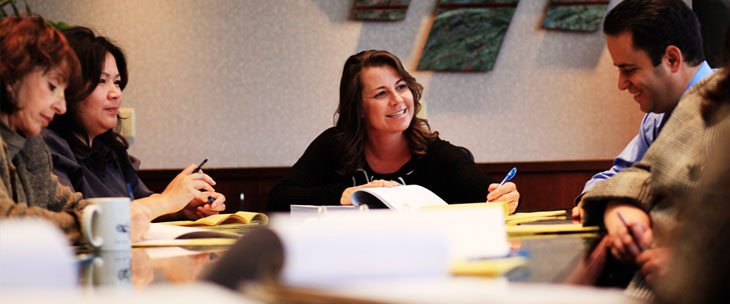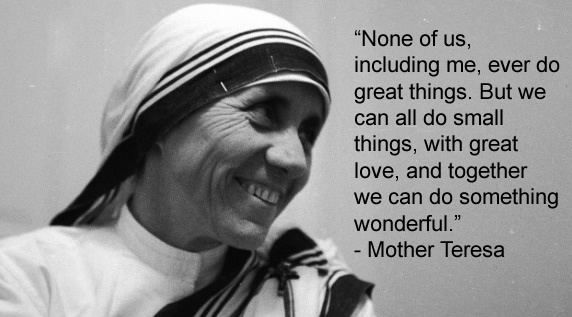Do a search on incivility and rudeness in the workplace and you will come up with hundreds of posts. It’s a hot topic for a reason…
As you’re looking for answers on how to improve your workplace climate, you’ll find a ton of great courses, resources and tips. There are tools to teach people how to speak in ways that are not inflammatory, that address the problem not the person, step-by-step guides on de-escalation, and setting expectations to create an environment where people speak and act with civility towards each other.
People spend a lot of time and money trying to develop leadership skills, build credibility and become better at expressing their ideas to others in an ongoing attempt to advance their careers. These are all great things to do, but what is missing from the lists, techniques and goals is a foundation based on personal motivation.
To establish a healthy, successful workplace climate there needs to be inner motivational intent to do good and to be good. Energy follows intent. Without real intent, strategies become empty shells.
So, unless we tap into the meaning of and repercussions to showing courtesy, respect and thoughtfulness to others, all the training in the world won’t make things better.

That intent upon which we must focus is the inside aquifer which brings out the best in us. This inner aquifer is the motivation that fuels the development of virtues, in contrast to self-interest which brings out the worst in us, our vices. Virtues are closely related to spiritual principle. When we have looked within to clarity and anchor our intent in a spiritual principle, we are much more likely to treat others in ways that they will feel valued and appreciated.
Children as young as 18 months show both altruism and selfishness. Whatever the parents pay attention to is what grows. It is the same with the workplace. Pay attention to practicing virtue and it will grow, not only in you, but in others because the aquifer that feeds your sense of good is the same that feeds the sense of good in others.
The intent to do and be good
When we actively and consciously practice virtues at home and work, a foundation for satisfying human relationships is laid. One way to get started is to learn the language of virtue. Most of use don’t have a very big virtues vocabulary and being able to name what we see and experience can be the first step in tapping into the virtues we and others already have.
Here is how it works. Instead of getting upset at challenges and inconveniences, we reframe our perception to see them as gifts. Challenges are welcomed and transformed by focusing on the virtue part of the equation, rather than on the vice, like this:
- Replace love of power with power to love.
- Replace need to be right with the desire to be kind.
Just think about that for awhile and let it sink in.
What’s important is to practice. It means actively using virtues vocabulary in our everyday speech and enabling ourselves to transcend negative triggering situations where we are tempted to act out of anger, jealousy, control, fear or hatred and channel the trigger towards our more noble selves through focusing on love, caring, honor, integrity and respect. This short list will get you started and here is link to the Virtues Project cards you can use to keep going: http://www.virtuescircle.org/shop.html
In turning focus toward virtues, you’ll notice that power struggles are often removed because people become unified in working toward the same lofty goal. Since no one ever achieves perfection in any virtue there is nothing to argue about, we just keep striving towards the spiritual principle. As soon as you get better at one thing, say appreciation, you are faced with new opportunities to find ways to be appreciative that require more effort and more strength of character.
Now let’s get into the operations part…
Learning to see virtue in others
The easiest way to start using the language of virtue is to first practice seeing it in others. Looking for qualities instead of faults, loopholes and errors in thinking can become an excellent counterbalance to criticism.

For example:
- “Thank you for being helpful, I see you practicing helpfulness all the time!”
- “You said that so clearly.”
- “Your thoughtfulness is really contagious.”
When you start focusing on finding the hidden gems of virtue in people, they will rise to the occasion to prove you right and do even more. It is the same idea as focusing on the one good trait rather than the 10 bad ones. What you focus on grows.
You can also practice seeing virtue in yourself to cure the diseases of perfectionism and negative self-talk:
- “I showed a lot of diligence in getting this done.”
- “I’m proud of myself that I showed self-control when I didn’t lose my temper with my coworker.”
- “I can totally be assertive! Didn’t I just prove that to myself?”
When you or others fall short, instead of jumping immediately to a negative judgment, say:
- “I know we can do this. Let’s apply more perseverance.”
- “I missed that opportunity, but I will catch the next one. I can be patient with myself.”
Priming the day for virtue
I start my day with prayer and meditation, and randomly choose a “virtues card” from the package I ordered from The Virtues Circle. It is kind of uncanny how whatever I pick always speaks to me directly about something I need to practice that day. Doing a “virtues pick” in the morning is a great way to develop the habit of using virtues in your language and throughout your day. That practice of using the language of virtues in your daily speech will spread through the workplace like a warm blanket – or, depending on where you live, perhaps a cool breeze!
Just yesterday I was feeling overwhelmed with all my responsibilities. I picked the card “peacefulness,” read the definition and immediately decided to take a deep breath and think of the words ‘be peaceful’ when I was feeling overwhelmed. I used the word “peaceful” three times in workplace conversations, and noticed how others responded by being calmer and more focused.
To get an idea of how powerful this is, here is the virtues card’s definition of courtesy:

Courtesy
Courtesy is treating others with kindness and tact. We take the time to speak and act graciously, showing people that we value and respect them. We make requests not demands. We remember our manners, greet others warmly, and listen closely when they speak. Courtesy is a way to honor others, showing them how much they matter to us by how we treat them. Those closest to us need our courtesy most of all. Courtesy is the mirror of their value.
On the back of the card you will find a quote:
“See ye not, Courtesy is the true Alchemy, turning to gold all it touches and tries?”
(George Meredith “The Song of Courtesy”)
Then it ends with an affirmation:
“I am thankful for the gift of Courtesy. It sweetens my relationships.”
Wow. How about reading that out loud at a staff meeting before starting? Do you think you might have a better workplace atmosphere if you started meetings that way? You could put it up as a poster or a screen saver. All the visual reminders help to keep the idea of courtesy front of mind.
If you don’t want to get a virtues card pack, why not write your own definition at the beginning of the day? Or ask people at a staff meeting what “courtesy” or another value means to them and discuss it for five minutes together? Someone might like to look it up.
Another way to integrate virtues is to “check in” with your team and if they are feeling bad about some difficult client interaction or work issue, ask them what virtues could be applied to solving the problem. Help them come up with different ways they could think about the people involved with the conflict and perhaps even the people involved with the solution (so often there is an overlap there…).
Up for 30-minute presentation?
Zen Workplace put together a one-day online conference all about keeping you sane while you build your team and your career. Marie was one of the 15 speakers during the event. Listen to her presentation and get the download too!
Listen to Marie’s presentation HERE
However you decide to do it, the focus on the word will improve the workplace atmosphere because it calls us to our spiritual selves in a way that is inclusive and respectful of all or no religious traditions because the focus is on universal values.
Setting clear boundaries

The next step to getting to a fabulous workplace climate infused with goodwill is to learn to set boundaries for yourself and to help others do the same. This means you define what you expect according to principle, and then firmly but gently hold to it. You hold up the principle as the ideal, describe how it might look and feel and then stay focused on it.
And I know what you’re thinking: “This is easier said than done…”
It takes some practice not to cave in to others’ demands or to get angry, but you can do it, and when you do your actions serve as indirect instruction to others.
Let’s consider some examples of what this could look like. When you have a domineering personality constantly interrupting you could say:
- “I know you are anxious to explain ___________ to me, but Joe is next and I’m sure you want Joe to feel included in the conversation. Thank you for practicing patience and for listening without interrupting.”
- “Let’s focus on what we can learn from each other by listening deeply and showing respect to the speaker.”
- “I appreciate when everyone shows courtesy by taking only their share of time to explain their own point of view. Let’s make sure everyone gets equal time to speak so everyone can be heard.”
When you set and respect boundaries, you increase trust and people feel secure with you.
Respect
Let’s look at the virtues card definition for respect:
Respect is an attitude of honoring ourselves and others as people of value. We care for each person’s dignity. Everyone has the right to expect respect. We show respect in the courtesy of our words, and in our tone of voice. We are all exquisitely sensitive to respect. When we treat others as we would like to be treated, we raise the level of trust and peace in our relationships. Respect is having reverence for the earth and all living things. When we live respectfully, we are a source of grace in the world.
And a quote:
“There is a longing among all people and creatures to have a sense of purpose and worth. To satisfy that common longing in all of us we must respect each other.”
(Chief Dan George)
Here is the affirmation:
“I am thankful for the gift of Respect. It helps me to handle life with care.”
See how powerful it is to focus on these virtues principles? They cut through inauthenticity and find the center of what really matters.
Continuing with our current example of respect, another way you can actively use virtues at work is to ask virtues-based questions:
- “What does it mean to you to be respected?”
- “What happens for you when you feel respected?”
- “How do you think we can affect others more positively by using respect?”
- “What do you need to feel safe to be yourself in this workplace?”
One well-placed virtues question a week in the workplace can get people autocorrecting their behaviours quite quickly. I’m sure you can practice creativity and think of interesting ways to naturally insert a virtues question into multiple workplace interactions!

Concluding with thoughtfulness
So far I have written about the virtues of Courtesy and Respect and considered ways to develop a foundation for healthy workplace relationships using the practices of looking for virtues in others, reminding ourselves of our own capacity to practice virtue and calling virtue out when we are challenged. I wrote about seeing difficulties and problems as gifts to develop character by transforming negative thoughts and actions to positive ones through the language of virtue. And I suggested the idea of asking the occasional virtues-based question that brings out virtues awareness and causes people to improve their attitudes and behaviours as they consider the virtue.
I would like to end with the virtue of Thoughtfulness. If the workplace becomes characterized by Courtesy and Respect, you will start to see acts of Thoughtfulness becoming more and more common. If you are not used to it, it requires an active and conscious act of will to start showing Thoughtfulness, but after a bit of practice, it becomes very natural. When you buy a coffee or tea, choose another for a colleague. Bring the occasional food item to share with the staff. Compliment your co-workers. Share a book you enjoyed. Inquire into the health of a co-worker’s relative. Do the staff room dishes when it isn’t your turn. It doesn’t take much, but an attitude of thoughtfulness goes a long way towards creating the kind of workplace we will think about with fondness and appreciation.
Here is the virtues card quote on Thoughtfulness:
Thoughtfulness
Thoughtfulness is kindness guided by empathy. It is carefully considering a course of action with discernment and honesty. It is giving importance to other people’s needs. We think about them, observe what they need and offer help. We pay careful attention to their likes an dislikes and do things that give them happiness. We carefully consider how our actions will affect them. Thoughtfulness helps us to move beyond self-centeredness to become true companions. Little gifts of thoughtfulness can brighten someone’s day. Lifelong thoughtfulness illumines our relationships with abiding joy and trust.
And a quote:
“Let them at all times concern themselves with doing a kindly thing for one of their fellows, offering to someone love, consideration, thoughtful help.”(‘Abdu’l-Baha)
The affirmation is:
“I am thankful for the gift of Thoughtfulness. It brings grace to my relationships.”
Practicing just these three virtues: Courtesy, Respect and Thoughtfulness will awaken your own inner leader. You will discover talents and gifts of character you never knew you had. That is because when we consciously practice spiritual principle, we anchor everything we do to what is right, true and good. Don’t worry if you make a mistake or if you have trouble being consistent at first. Treat your own progress with the Courtesy, Respect and Thoughtfulness you are striving to use with others. And end the day with gratitude for having had another 24 hours of life and opportunities to make the world a better place. This is the secret of right living.
Looking for more ways to STAY SANE as you build your career?
Want to listen to Marie’s presentation? Access it HERE!







